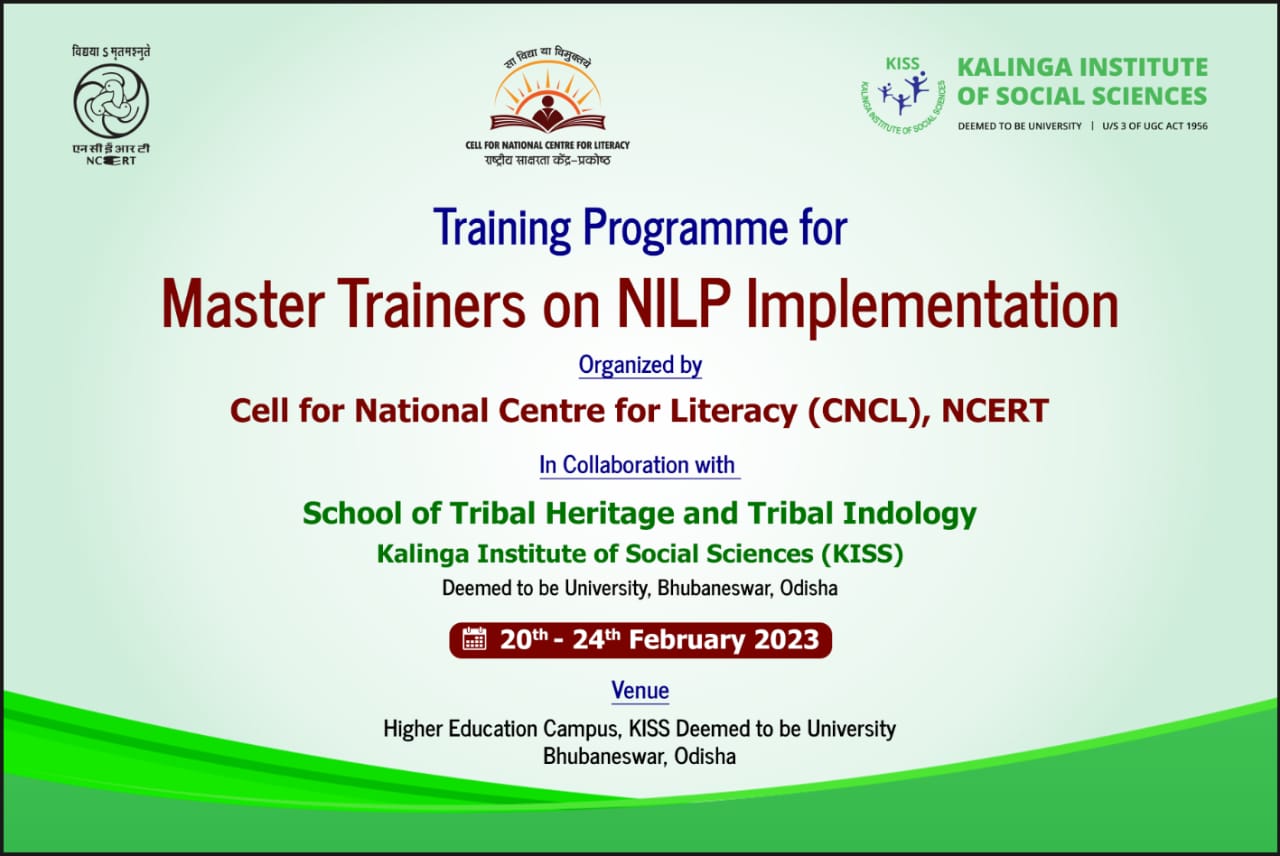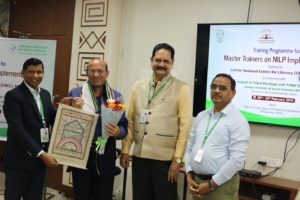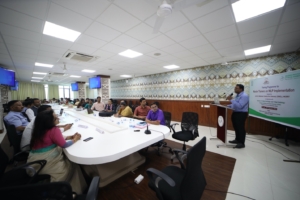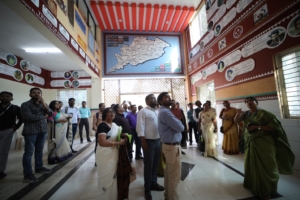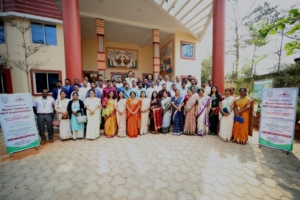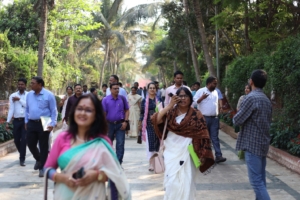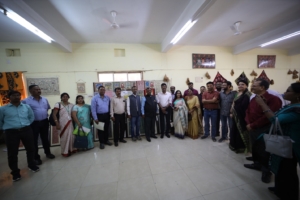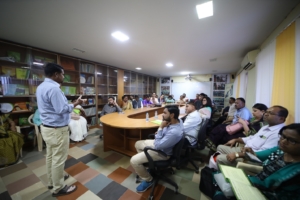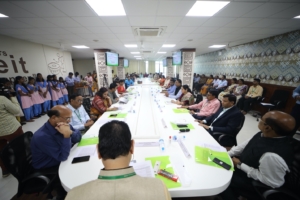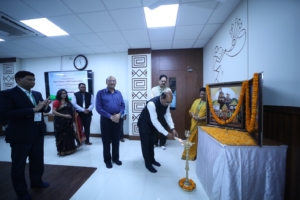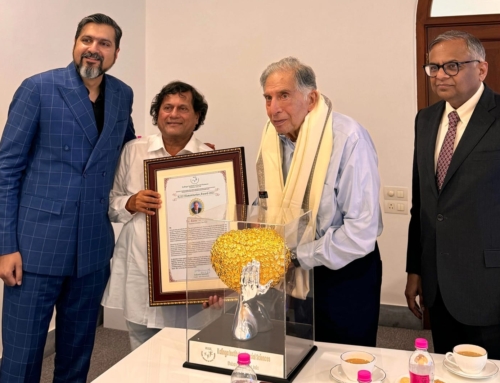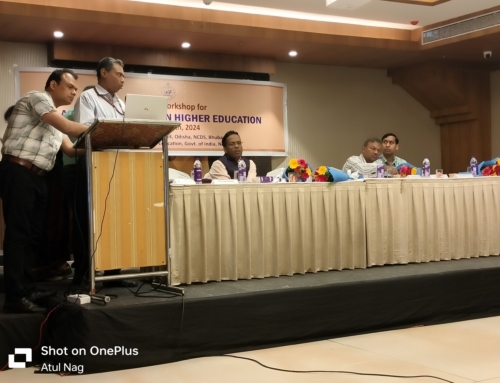The Cell for National Centre for Literacy (CNCL), NCERT in collaboration with the School of Tribal Heritage and Tribal Indology (STHTI), KISS-DU organized a 5-day training programme on New India Literacy Programme (NILP) Implementation from 20th February to 24th February 2023
Day – 1 (Inagural Session)
Date 20/02/2023
Session was initiated by Dr. Bani Bora, Senior Consultant Cell for National Centre for Literacy (CNCL) in which she briefed about the historical perspective of NILP. She discussed about the five components of NILP, structure, mode and implementation of NILP. Dr. Bora shared the roles and responsibilities of volunteer teachers. She explained the importance of Mobile Survey App for NILP in identification of targeted non-illiterates and voluntary teachers. She further added the saturated age to be included was from fifteen to thirty-five years and girls, OB/SC/ST and person with special needs. Dr. Bani Bora also emphasized conduction of assessment twice a year by both state and UT in offline mode at School. She also spoke about Online Teaching Learning and Assessment (OTLAS) in this context. A very important aspect of ‘Janandolan’ was discussed which meant involvement of all government and aided schools, teachers, community involvement, philanthropic / CSRNYKS, NSS, NCC volunteers, Ex-servicemen, angadwadi workers, State/UTs and media.
Dr. Bani Bora discussed the module in which she spoke about the diverse circumstance of NILP learners their psychosocial behavior and situational needs. She insisted on developing empathetic approach towards the challenges faced by NILP learners.
Day – 2
Date-21/02/2023
The program started with recapitulation of day – 1 by Dr. Neha Jha, Assistant Professor, KISS-DU.
Presenting on day – 2, Dr. Neelkanth Kumar, Assistant Professor, CNCL started with the discussion on Education scenario in India. He imparted that equitable quality education and lifelong learning are the goals. He discussed about the digital divide. He explained use of ICT in India, recommendation for online and digital education and major Digital initiatives like Diksha.
Speaking in turn, Dr. Rohit Nainwal, CNCL in which he discussed Education for All, Technology for implementation of NILP, Curriculum Framework for Adult Education, Digital Resources for Education for All, difference between adult and child learner, Andragogy that is the art and science of helping adult learners, self-concept, Jack Mezirow transformative learning, its importance and application. The post-lunch began with a field visit scheduled for the participants at KISS DU.
Day – 3
Date-23/02/2023
After the Recapitulation of the previous session Mr. Shiva Srivastava JPF, CNCL commenced the session by taking inputs on the programmes running in different states. Tola Sewak and baligan was explained by participants from Bihar and Jharkhand. He also mentioned that in 5 years 5 crores non-literate people have to be educated and made literate. He discussed history of adult education by mentioning various literacy programs run by the government. He spoke about the Sustainable Development Goals, NEP-2020 target, component of education for all.
Next session was carried by Dr. Neelkanth Kumar, Assistant Professor, NCERT in which he discussed about literacy and numeracy. He discussed about whole language approach and decoding. He suggested that learner should learn from their environment and existing voices, sounds and objects around. We should connect to the learner’s experience and culture. He shed light on how adult learner come according to their necessity. He insisted on practical implications rather than theories.
The subsequent session was taken by Dr. Yasmin Ashraf, Consultant, CNCL in which she discussed Nav Bharat Saksharta Karyakram, Components of Critical Life Skills, being empathetic towards learners, screening of learners and creating conducive learning environment. She asked the participants from different states to make an action plan of enhancing literacy, numeracy and critical life skills in the learners by integrating previous experience. She also talked about Teaching Learning Methods, Andragogy and its assumption, Strategies for teaching adult learner and Primer Ujas. She also informed all that Ujas was available in 18 different languages.
In the last part of the session the action plan made was executed by different states. Dr. Yasmin Ashraf critically analyzed and further put forward her views and suggestions. Participants from other states also came up with their feedback.
Day – 4
24/02/2023
Session started with recapitulation done by Dr. Neha Jha. The 4th day was graced by Dr. Shiva Srivastava, JPF CNCL. He explained about Continuing Education: Post Literacy strategies, Role of voluntary teachers, classroom learning, experience sharing and how it generate positive energy. He explained beautifully with examples the concept of numeracy and literacy. He also discussed about continuing education program, role of NIOS and NILP, level of basic education preparatory, middle, secondary and level A,B,C and D. He spoke about Basic Literacy Assessment Program, Sakshar Bharat ke Antargad (2009-2018), Flexible Entry System Under OBE program, schemes of studies, subjects under OBE program, secondary courses, vocational educational program and different mediums of learning.
In the last part of the session, he explained print media and non-print media, role of ICT, internet, multimedia and computer. Thereafter the Action Plan prepared by the Master Trainers of different states and Union Territory presented was presented and feedback by other participants was taken on such plan.
Day – 5
24/02/2023 (Valedictory Session)
Valedictory Session organized in hybrid mode in which the dignitaries of CNCL-NCERT joined online. The session started with the welcome address by Dr. Neelkanth Kumar, Assistant Professor, NCERT. Remarks on Five-day training program was given by the Trainees of different parts of India: Odisha, West Bengal, Andaman and Nicobar Islands, Maharashtra, Bihar and Jharkhand.
Professor Deepak Kumar Behera, Hon’ble Vice Chancellor, KISS-DU thanked Prof. (Dr.) Usha Sharma, Professor & In-charge, CNCL for collaborating with KISS-DU to conduct this training Program. Professor Behera in his address assured that the tribal students of KISS will materialize the mission of CNCL in their native places where dropout rates are high. Further, he proposed Professor Sharma to explore the avenues of collaborating with CNCL and NCERT. Prof. Usha Sharma addressed all the participants and congratulated them for their commitment to join with CNCL in eradicating illiteracy from their concerned states. She appreciated the unconditional support provided by KISS-DU for conducting the training program and welcomed Professor Behera’s to join hands with KISS-DU in future.
Dr. K.C Mahali (Retd. IPS), esteemed DG, KISS-DU also addressed the gathering by highlighting the contributions of KISS and spoke about how this University protects, preserves and promotes the tribal heritage and culture. Professor Behera distributed the certificates to the Master Trainers of different States and Union Territory after their successful completion of Five-day training program.
Dr. Manoj Kumar Behera, Dean, School of Tribal Heritage and Tribal Indology (STHTI) acknowledged Prof. (Dr.) Achyuta Samanta, Hon’ble Founder, KIIT and KISS for providing such a wonderful platform for conducting the training program, CNCL-NCERT for collaboration, the Officials and Resource persons of CNCL, Hon’ble V.C, Esteemed Registrar, Esteemed D.G., Professor Emeriti, Core Committee members and other dignitaries, Master Trainers and, each and every one who contributed for the grand success of the event. Professor B.B Mishra Professor Emeritus, KISS-DU presented the closing remarks and the program concluded with a Vote of Thanks proposed by Dr. Yasmin Ashraf, Consultant, CNCL.

